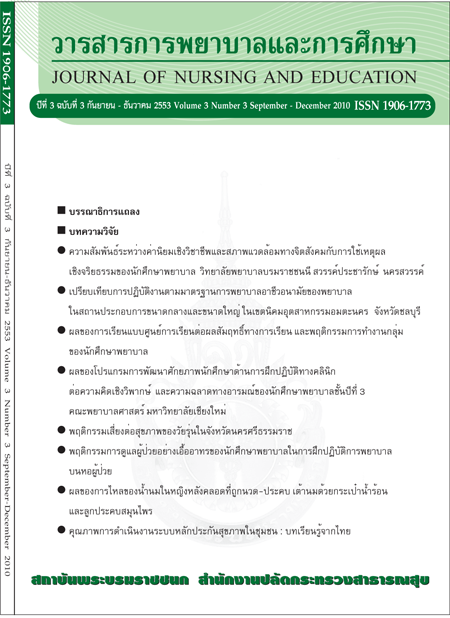คุณภาพการดำเนินงานระบบหลักประกันสุขภาพในชุมชน: บทเรียนรู้จากไทย
คำสำคัญ:
Security System in the Community, Lessons Leamed from Thailandบทคัดย่อ
บทคัดย่อ
การวิจัยครั้งนี้เป็นมีวัตถุประสงค์ เพื่อถอดบทเรียน ผลการดำเนินงาน กองทุนหลักประกันสุขภาพท้องถิ่น ที่ประสบความสำเร็จในการดำเนินงาน กลุ่มตัวอย่างคือพื้นที่ต้นแบบจำนวน 145 แห่ง ซึ่งคัดเลือกโดยใช้เกณฑ์ ของสำนักงานหลักประกันสุขภาพแห่งชาติ และเก็บข้อมูลจากบุคลากร ขององค์กรปกครองส่วนท้องถิ่น บุคลากรสาธารณสุข ประชาชนและผู้เกี่ยวข้องทั้งสิ้น 2,875 คน ผลการศึกษา สรุปได้ดังนี้
การจัดตั้งกองทุนฯ ขององค์กรปกครองส่วนท้องถิ่น เกิดจากการรับทราบนโยบาย เห็นถึงประโยชน์ ที่ชุมชนจะได้รับ การประสานงานจากหน่วยงานที่เกี่ยวข้องในการดำเนินงาน มีทุนทางสังคมในการจัดการ ของชุมชน จึงมีการทำประชาคมในชุมชน การศึกษาดูงาน และการจัดตั้งคณะกรรมการ รวมถึงการจัดทำระเบียบ ในการดำเนินงาน บนพื้นฐานของหลักธรรมาภิบาล
ผลจากการดำเนินงานกองทุนฯ องค์กรปกครองส่วนท้องถิ่นมีความตื่นตัว มีการปรับเปลี่ยนกระบวน ทัศน์ในการพัฒนาชุมชนเพิ่มมากขึ้นเช่น มีการจัดทำแผนพัฒนาสุขภาพชุมชนที่ชัดเจนขึ้น ประชาชนมีส่วนร่วม ในการดำเนินงานพัฒนาสุขภาพของชุมชนมากขึ้น เจ้าหน้าที่สาธารณสุขมีส่วนในการช่วยส่งเสริมการดำเนินงาน ของกองทุนฯ และตื่นตัวเกี่ยวกับการกระจายอำนาจด้านสาธารณสุขให้แก่องค์กรปกครองส่วนท้องถิ่นแต่อย่างไร ก็ตามรูปแบบและวิธีการประเมินผลการดำเนินงาน ยังไม่มีเป็นรูปธรรมชัดเจน ตลอดจนพลังความเข้มแข็งของชุมชน ยังไม่ถึงระดับที่มีความรู้สึกเป็นเจ้าของและสามารถพึ่งพาตนเองด้านสุขภาพได้
ปัจจัยแห่งความสำเร็จในการดำเนินงานที่สำคัญคือ (1) องค์กรปกครองส่วนท้องถิ่นและทีมงาน มี ความเข้าใจในระบบหลักประกันสุขภาพ (2) สัมพันธภาพที่ดีระหว่างทีมผู้บริหารขององค์กรปกครองส่วนท้องถิ่น
กับเจ้าหน้าที่สาธารณสุข และประชาชนในพื้นที่ (3) ภาวะผู้นำของนายกองค์กรปกครองส่วนท้องถิ่น และการ ประชาสัมพันธ์ที่มีประสิทธิภาพ ส่วนปัจจัยที่ทำให้งานสำเร็จล่าช้า/อุปสรรค คือ การขาดบุคลากรด้านสาธารณสุข ประจำที่องค์การบริหารส่วนตำบล ความเข้าใจที่ยังไม่ชัดเจนของกรอบและแนวทางปฏิบัติในการดำเนินงาน กองทุนฯ
Abstract
The purpose of this evaluation research was to explore lessons learned of success of health security system of demonstrated settings at local level. One hundred and forty five areas were selected to be as the sample in this study by the National Health Security Office’s criteria. Data were collected from 2,875 persons who were stakeholders in health security fund of demonstrated settings at local level including local administrative officers, health personnel, and people in the community settings. The results revealed as follows:
These health security funds at local level were established by responding policy, perceiving benefits to community, realizing common interests with organizations related in processing health security fund at provincial and regional levels, and extending social foundation in a community such as the contractual saving and welfare groups (Sajja Aoomzump Groups). On processing of health security fund, civil society in the community, committee setting up, and rules in order to fix the line were established under the Nation Health Security Office’s regulations and on the basics of Good Governance.
The result of this project made the local administrative office alert and prideful. A change of paradigm of health development in the community dramatically increased. For example, the community health plan was made clearer, people increased to participate in community health development, and health personnel also took more action as a promoter and supporter in this project. Furthermore, health personnel were alert about decentralization of public health tasks to local administrative office. However, there was no evidence of appropriate pattern and evaluation methods in the project. In addition, the community’s power was not able to make people get through partnership and self-reliance.
Key success factors of the projects were (1) local administrative officers need to understand in a health security system, (2) a good relationship among the administrators of local government, the health personnel, and local people should be addressed, (3). an administrator of local government’s leadership and effective public relations were very crucial. On the other hand, lack of health personnel working at local administrative office and unclear of framework and guideline of practice were the important barriers in the project management






